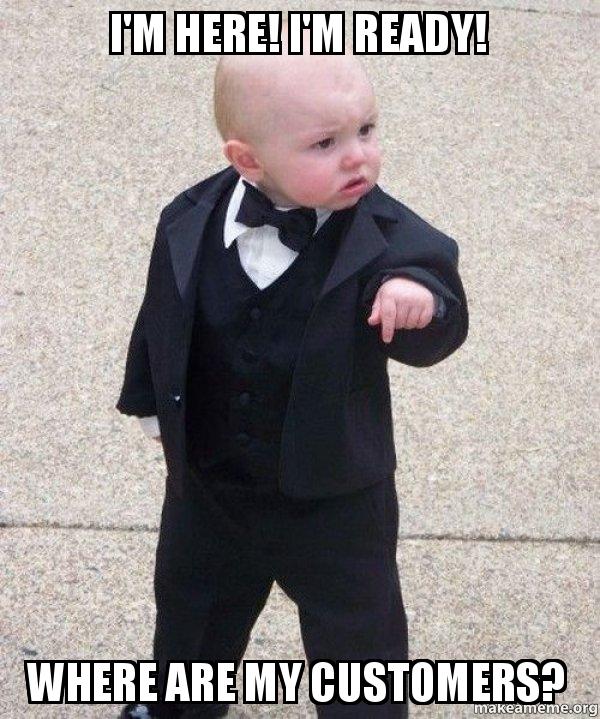The 2 Biggest Marketing Mistakes Caterers Can Make (and how they’ll mess up every business decision you make)
Two of the biggest mistakes caterers can make that will also mess up every business decision you make have to do with your audience. Do you know your audience and how to reach them? If you don’t have a really well-defined answer to this question, then you are likely wasting your marketing and prospecting time.
The two biggest mistakes caterers can make are:
1. Chasing after the wrong audience, and
2. Going after an audience that is too broad—trying to be all things to all people.
Fortunately, we here at Total Party Planner have 4 antidotes to this problem—4 questions to consider that will help you define who you are as a caterer and how to find the clients who are the right fit for your business.
1. You Can’t Be All Things to All People.
OK, this first item is a statement, not a question—but it is an important realization. Even well-established businesses can get side-tracked by jobs and clients that wouldn’t fit their usual client profile. Are you a no-nonsense, low-cost, no-frills caterer? A high-end, all-the-bells-and-whistles caterer looking for the big-ticket events? Do you want to focus on corporate or private events? Small dinner parties? Entertainment catering? Do you want to specialize in vegan catering or barbecue? Depending on where you live and work and what the demand is, there is probably a niche market out there—how well can you fill it?
2. Who do you like to work with?
Another way to ask this is: Who is your ideal client? Some clients are going to be more demanding. Different kinds of events will demand different things of you and your staff. Do you like being able to take your time and add a personal touch to every dish you create? Then perhaps smaller, more personal events are for you. Or maybe you like the thrill of providing gourmet box lunches to VIPs at a 10,000-person tradeshow. What is it you really enjoy doing—the kind of thing that got you into catering in the first place? The more you enjoy what you do, the better job you’ll do—not to mention that you’ll be more relaxed and in your element. That’s likely to lead to better word-of-mouth referrals—and a better reputation overall.
3. What are your specialties?
There are many creative ways to tie in what you love and what you’re good at that will help you distinguish yourself from your competitors. Specialties can include anything from food and desserts to décor to your special way of dealing with certain kinds of events and personalities. What are you really good at, and how can you translate that into finding the right audience for you? If you’re really organized and well connected with folks in your area, maybe you can promote yourself as an all-inclusive event organizer. Maybe you are really good at sports and want to focus on outdoor events—corporate picnics, family reunions, and other occasions where you can organize some team building and sports play. Get creative and have fun! Then, your clients will have fun too.
4. How will you reach your audience?
 Now that you’re starting to get a better idea of who your audience is, where will you find them? Where are they hiding—and what kind of messaging is going to convince them to call you for their event? The best ways to find the audience you seek are to talk to people, network, and do some research on the Internet and in local media. When you attend networking events, don’t just say, “I’m a caterer who specializes in big weddings and corporate events.” Say, “I’m looking to meet the corporate event planner at XYZ, Inc., as well as brides who are getting married in the next 9-12 months with guest lists over 200.” The more specific you can be, the more you will help others find the right audience for you. (And remember to ask them whom they’re looking for, too, so you can return the favor.)
Now that you’re starting to get a better idea of who your audience is, where will you find them? Where are they hiding—and what kind of messaging is going to convince them to call you for their event? The best ways to find the audience you seek are to talk to people, network, and do some research on the Internet and in local media. When you attend networking events, don’t just say, “I’m a caterer who specializes in big weddings and corporate events.” Say, “I’m looking to meet the corporate event planner at XYZ, Inc., as well as brides who are getting married in the next 9-12 months with guest lists over 200.” The more specific you can be, the more you will help others find the right audience for you. (And remember to ask them whom they’re looking for, too, so you can return the favor.)
And as far as messaging goes, your messaging should strike at the very heart of the biggest concern of your clients. Are they more worried about the quality of the food or about making an incredible impression on their guests? How can you put their fears to rest by exhibiting confidence, knowledge, and sensitivity to their needs?
The problem with not knowing the answer to these questions is that you could be making business decisions based on the wrong information—which can lead to wasting time and money,
That’s why discovering the answers to these questions will not only make your job more fun—they should make your business more profitable too.